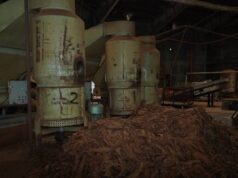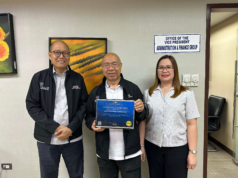Amid the pandemic, Mayor Carmelo “Pogi” Lazatin, Jr. initiated the Angeleno First Alternative Livelihood Program, where 121 homebased mananahis were hired to produce 30,250 facemasks and 2,420 Personal Protective Equipment (PPEs), which will be distributed to the city’s frontliners, health workers, and indigent residents.
ANGELES CITY – The city government on January 26, 2021 released photos of the free reusable facemask prototype that will be distributed to the city’s front liners, health workers, and indigent citizens.
Amid the pandemic, Mayor Carmelo “Pogi” Lazatin, Jr. initiated the Angeleno First Alternative Livelihood Program in August 2020, through the Angeles City Economic Development Investment Promotions Office (ACEDIPO), and Public Employment Services Office (PESO), to provide sustainable livelihood for marginalized sectors of the city including solo parents, persons with disability (PWD), stay-at-home parents, and women’s groups to help them recover financially.
According to Executive Assistant IV Reina Manuel, 121 home-based mananahis were hired by the city government, to produce 30,250 facemasks and 2,420 Personal Protective Equipment (PPEs).
Mayor Lazatin personally inspected the finished facemasks and PPEs turned over to the city government last January 5, with Chief Adviser and Tactician Director IC Calaguas, Executive Assistant IV Manuel, ACEDIPO Officer-In-Charge (OIC) Irish Bonus-Llego, and Angeles City Disaster Risk Reduction and Management Office (ACDRRMO) Head Rudy Simeon.
Meanwhile, Calaguas expressed her gratitude to the 17 Angeleno designers who volunteered their time and skills, to guide the home-based mananahis in creating the said facemasks and PPEs namely: Rich Sabinian, Rosette Biag, Danica Zita, Manny Ocampo, Stephen Victoriano, Jhune Angeles, Joey Feliciano, Bhry Adefuin, Jojo Macapinlac, Mich Viray, Carl Miranda, Cholo Ayuyao, Richard Hill, Rop Syquia, Philip Dizon Torres, Marlon Tuazon, and Frederick Policarpio.
Aside from giving Angelenos an alternative source of income, the livelihood project also intends to protect the environment, minimizing carbon footprint since the facemasks and the PPEs can be reused.
With the success of the facemask livelihood program, the city government is planning to launch other programs including tinapa-making, basket-weaving, eco-bag making, rice retailing and atchara-making.





